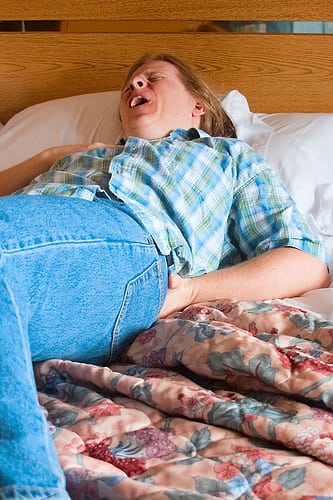
There are various reasons why sleep is important. Studies show that sleep problems can affect as many as 75% of the population and chronic sleep problems contribute to various health issues including poor immune systems, the gaining of weight and high blood pressure [1].
When we get enough sleep, our minds are able to be more prone to learning and retaining memory.
Enhanced or optimized sleep cycles also help the body fight disease due to a more efficient immune function and the ability of the cells in the body to keep up resistance to inflammation, bacteria, viruses and other sources of ailments. The significance of the problem of pain and sleep should not be ignored [2].
Indeed, good sleeping habits can provide us with reduced stress levels, improved moods, increases safety or reduced propensity to fall during the day and get injured, better cardiovascular health, balanced hormone levels and adequate body metabolism rates.
People may not be getting sufficient sleep as a result of different factors and learning about the things a person could do to combat lack of sleep is worthwhile. One important factor that may be contributing to your lack of sleep is the “pain” that you could currently be experiencing. Pain may affect the body in various ways including causing discomfort, the inability to move certain parts of the body, the loss of feeling or sensitivity in parts of the body and the inability to get enough rest or sleep. However, there could be ways to combat these effects or causes of your pain so that you are able to get enough sleep.
The following are 5 steps to do if your sleep is being affected by your pain:
1. Fight the Pain
The inability to sleep due to pain in the body can be uncomfortable and could cause anxiety [3]. In essence, pain can cause sleepless nights and in return the inability to sleep further exacerbates the pain. It could lead to a never-ending cycle if nothing is done to address the root cause of the problem, which usually resides at the source of the pain. Hence, fight the pain! Deal with the issue from the main source of trouble.
Sometimes, the body needs time to heal and for the pain to subside. However, there could be ways to prevent a person from suffering through the pain or injury. There are different types of pain relievers that exist and seeking natural ways to relieve pain can be beneficial. There are herbs that have natural analgesic properties that could help calm the nerves and also numb the pain a person may be experiencing [4].
Taking herbal teas and natural medications a few hours before bedtime could help sleep to occur naturally and without abrupt interruptions due to pain. There are also less natural varieties of medications and care should be taken to ensure that the medications do not have adverse effects such as inadvertently keeping a person awake all night while attempting to dull the pain.
2. Maintain an Appropriate Room Temperature
Do you notice how things may seem to get exaggerated when we are uncomfortable? The body is great at sensing discomfort in whatever form it may arrive or appear in. Body temperature and how the body reacts to the temperature of its environment also provide an opportunity to increase any existing pain or make the pain we currently feel seem even more unbearable.
A person may toss or turn so much more when trying to sleep in a room or location that has a very hot or cold temperature. Excessive heat could make a person begin to sweat and being sticky and uncomfortably prompts a person to try to move or shift positions in an attempt to improve air flow or reduce the amount of sweat. Similarly, very cold environments cause a person to want to cringe or curl up in a ball, further worsening any existing pain and making a person more uncomfortable.
There is research regarding the relationship between insomnia, pain sensitivity and temperature detection thresholds with results revealing that there are lower heat thresholds for pain and implying that temperature can have an effect on how we handle pain [5].
In many cases, regardless of where the pain is, such pain can become more painful when movement occurs during sleep. When we are trying to sleep in a location that has an uncomfortable temperature, we are more likely going to try to move to cool off or curl ourselves into a ball to stay warm. To get adequate rest or good night’s sleep, keep the room cool or warm and comfortable.
3. Stick to a Healthy Sleep Cycle
Being able to adopt or maintain a healthy sleep cycle could be a challenge, especially if pain in the body is already trying to interfere with your sleeping rhythm or clock. Having and maintaining a strong sleeping pattern could help you greatly if your sleep is being affected by pain.
The body is great at being able to “remember” your sleeping patterns and this could have its advantages and disadvantages. On the positive side, if you have good sleeping patterns or had good sleeping patterns before the pain began, it is possible that your body will try to do what it has always done – get you to sleep as you usually do! With good sleeping habits, the body is more likely programmed to drift off to sleep at its usual time.
In this circumstance, the body may be able to fight through the pain and enable you get a good night’s rest because it is accustomed to doing so. However, the opposite could also be the reality if you have poor sleeping patterns. With poor sleeping patterns it could be much harder to get to sleep and this may be compounded by your pain. Hence, seek to develop good sleeping habits.
4. Use of the Bathroom
In other words, try to “go pee” before you go to sleep. Your insomnia could be worsened by increased toilet visits at night [6]. There are times that we work so hard to get to sleep only to wake up in the middle of the night to use the bathroom. This could nullify all the effort that you might have put into getting to sleep earlier in the night. Hence, do your best not to risk staying awake in the middle of the night. Watching the amount of liquid consumed before going to bed could be a good idea. Ultimately, if you have to pee in the middle of the night, then you have to go ahead and do it.
Another tip to use, which could help if you really need to go to the bathroom in the middle of the night, involves not lingering about when you wake up in the middle of the night. For example, if you get up to pee, get it done and go back to bed immediately. This could help you retain some of the sleepiness that could help you drift right back to sleep. The more you linger about or stay awake after waking up during the night – for example, to go get a sandwich – the less likely that uninterrupted sleep would return.
5. Exercise
Indeed, this may seem like a ludicrous idea. However, before you completely toss it out, think about how moving during the day could help the body get rid of some of its stress. Studies show that exercise can be effective in reducing complaints about insomnia [7].
Exercise could create opportunities for movement in the joints, muscles, tendons, ligaments and other parts of the body that may benefit from the movement. The caveat with exercise is that it needs to be handled carefully. Just like medications, recommendations from a primary care physician may be needed to ensure that the pain is not worsened by exercise. Being able to lightly move the affected part of the body – for example, the knee in the case of knee pain – could help reduce inflammation and make the pain less intense.
Begin with easy and slow movements that will help you gauge the thresholds that may create more harm than good. The use of exercise during the day could help prepare the body for uninterrupted rest during the night or during times of rest.
There are different things that could affect sleep and pain is one of these things. How do you prevent pain from halting your ability to sleep? Some the ideas mentioned here are steps that you could do to enhance your ability to rest and get a good night’s sleep. Some of the mentioned steps may not be easy to achieve immediately. However, having the knowledge of what to do and beginning gradually to do it can be useful.
If you are looking for other foods to help you with inflammation and pain, then check out 101 Superfoods that Fight Pain & Inflammation:
References
[1] Importance of Sleep – Harvard Medical School
[2] Pain and Sleep – National Sleep Foundation
[3] Living With Insomnia: Get a Good Night’s Sleep
[4] Supplements for Pain Relief
[5] Pain Sensitivity and Modulation in Primary Insomnia
[6] Is Exercise an Alternative Treatment for Chronic Insomnia?
[7] Insomnia Worsened by Increased Night-time Toilet Visits
Rick Kaselj, MS






